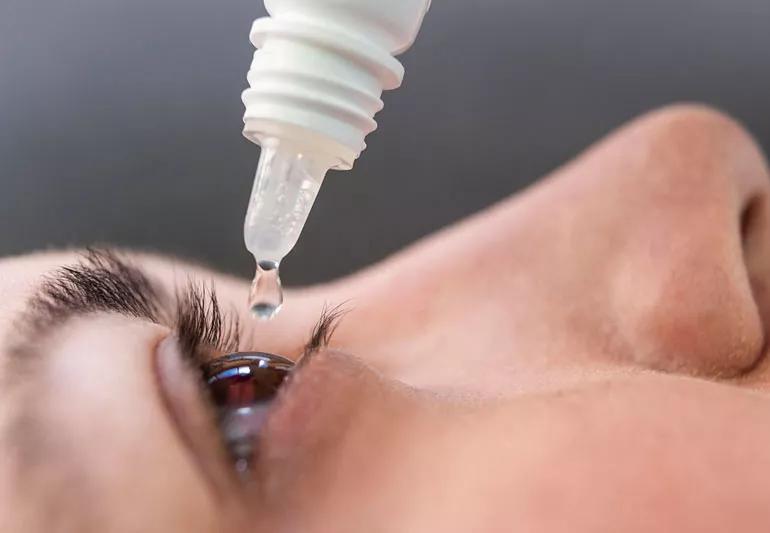How and when to use over-the-counter drops

Image content: This image is available to view online.
View image online (https://assets.clevelandclinic.org/transform/38df7197-c013-4c8a-8d6e-ee698be29271/safeEyeDrops-LMC-061820-770x533-1_jpg)
safe eye drops being put into eye
Itchy, watery eyes are the worst. But what’s even more troublesome is arriving at your local pharmacy to find so many over-the-counter eye drops to choose from. How do you know which eye drops will work best for you?
Advertisement
Cleveland Clinic is a non-profit academic medical center. Advertising on our site helps support our mission. We do not endorse non-Cleveland Clinic products or services. Policy
Ophthalmologist Peter McGannon, MD, breaks down eye-drop products into three categories based on their active ingredients.
How they work: When you have an allergic reaction — say to pollen, dust, or animal dander — your body releases histamines. These tell your body that allergens have invaded it, and, in response, your body triggers the classic allergy symptoms: runny nose and itchy, watery eyes.
Dr. McGannon explains that allergy eye drops work by blocking the histamine response in your body altogether.
“These drops block the overreaction of the body to allergens,” he says. Allergy eye drops most commonly contain an antihistamine (like pheniramine or naphazoline) or a newer, long-acting antihistamine (such as olopatadine or ketotifen), which prevent your body from releasing histamines in the first place.
Use: Allergy drops help reduce the redness, itching and watering from seasonal allergies from your eyes. Use, as needed, according to the instructions on the label.
How they work: These shrink the blood vessels on the surface of the eye — a process called vasoconstriction — that makes the redness go away. “Typically these drops may occasionally contain allergy relievers and mild lubricants,” says Dr. McGannon.
Advertisement
Use: As the name indicates, these help reduce the redness of irritated eyes. They’re okay for occasional use. But use caution: Overuse may make your eyes dependent on them, and they may make your redness worse if you use them for many days in a row. Dr. McGannon adds, “Using redness relievers regularly for chronically red eyes may mask more serious eye problems that need to be addressed by a doctor.”
How they work: If you have super dry eyes that feel itchy and gritty, artificial tears can bring relief. Artificial tears’ main focus is keeping your eyes moist and lubricated. “They are made to mimic the way real tears work in the eye,” says Dr. McGannon. They contain electrolytes and lubricants to keep your eyes lubricated and healthy. Use: Use them, as needed, to treat dry eye or to ease contact lens irritation or mild allergies. However, don’t confuse artificial tears with anti-redness drops, which you should use only sparingly, Dr. McGannon says.
Chronic dry eye can indicate a larger problem within the body. Dry eye is a common problem, especially as we get older. While contact lens wearers often experience dryness and irritation, women may experience dry eye after menopause because of hormonal changes.
“Symptoms of dry eye are typically scratchy, gritty, burning eyes or intermittent blurring, especially while reading or looking at screens,” says Dr. McGannon. “But contrary to what most people think, tearing is one of the most common signs of dry eyes.”
Tears are a reaction to dry eye, but these reactive tears are too watery and don’t lubricate the eye well, he says.
Dr. McGannon says generic store brands generally work as well as name-brand products for eye drops.
However, be wary of drops labeled “natural,” “homeopathic” or “herbal.” While they could work well for you, there is no reliable data to support their use or effectiveness, he says.
If you have seasonal or pet allergies that have been well-documented by your doctor, using over-the-counter eye drops, as needed, are appropriate.
“But if you have unexpected eye irritation after a recent upper respiratory infection or exposure to someone with a red eye, then there is a high probability of a viral or bacterial infection,” says Dr. McGannon.
“Eye conditions that are not improving with over-the-counter products, are quickly worsening, or are accompanied by severe pain or vision changes or loss should be evaluated by a doctor right away,” he says.
Advertisement
Advertisement

Delivered every Tuesday!
Sign up for our Health Essentials emails for expert guidance on nutrition, fitness, sleep, skin care and more
It's a letter about the news!

Every two weeks once
Sign up for our Health Essentials emails for expert guidance on nutrition, fitness, sleep, skin care and more.
Learn more about our editorial process.
Advertisement
From scratching your cornea and tearing your retina to introducing allergens and causing infections, pawing at your peepers just doesn’t pay off
Eye drops, cold compresses and a shower before bed can make all the difference
How to tell the difference between harmless redness and issues that demand attention
Eye drops and cold water rinses can help speed up healing for viral and allergen-related conjunctivitis, but a bacterial infection will need antibiotics
An allergist explains your over-the-counter options and combos
Eye crusts can signal an infection or your body’s natural self-cleaning at work
What to consider before you self-treat
Understanding the causes
Type 2 diabetes isn’t inevitable with these dietary changes
Applying a hot or cold compress can help with pain
Pump up your iron intake with foods like tuna, tofu and turkey